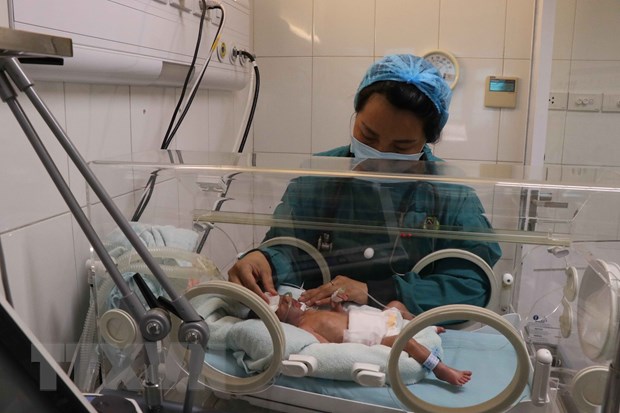 Society
Society

The Swiss Vietnamese Medical Association (HELVIETMED) announced that three Vietnamese scientists have won the Alexandre Yersin Prize for outstanding medical publications for Vietnamese medical researchers, according to the Swiss Consulate General in HCM City.

|
| A premature baby is cared for at the Hospital for Mother and Children in the northern province of Bắc Ninh. — VNA/VNS Photo Thái Hùng |
HÀ NỘI — The Swiss Vietnamese Medical Association (HELVIETMED) announced that three Vietnamese scientists have won the Alexandre Yersin Prize for outstanding medical publications for Vietnamese medical researchers, according to the Swiss Consulate General in HCM City.
They are doctor Nguyễn Thị Kim Phượng and associates at Đà Nẵng Hospital for Women and Children, Dr. Ngô Tất Trung and associates at Military Central Hospital 108 in Ha Noi and doctor Đặng Quang Vinh and associates at HCM City-based Mỹ Đức Hospital.
Phượng and her associates researched the early prediction of pneumonia that helps reduce antibiotic abuse. The group collected and analysed data from over 3,800 children aged from two to 59 months who were diagnosed with pneumonia and underwent treatment.
They found that based on World Health Organisation standards, nearly 41.7 per cent of the surveyed child patients did not get pneumonia and just 3.4 per cent of them had critical pneumonia. This means the majority of the patients should not have had been sent to hospital, resulting in antibiotic abuse.
Doctor Ngô Tất Trung and his associates at 108 Military Hospital conducted a study on early septicemia diagnosis.
With 114 patients’ blood samples, the doctors used a technique based on polymerase chain reaction to detect the DNA of bacteria in the blood samples.
This approach aims to detect septicemia with high accuracy and less time than blood culture which usually takes 48-72 hours to find germs (such as bacteria or a fungus) that can cause an infection.
Trung’s team created a quick test set Sepsis@Quick which produces results in four hours only. The quick test set is improved as now, it still fails to detect some types of bacteria or fungi.
Doctor Đặng Quang Vinh from HCM City’s Mỹ Đức General Hospital conducted a study to compare the effectiveness of two methods of preventing miscarriage for women with a short cervix.
This condition is one of the causes of premature birth and miscarriage, especially in pregnant women with twins.
Accordingly, the study conducted a clinical trial of 300 women in the hospital. They used cervical implantation pessary and used drugs containing progesterone (400mg / day) placed in the vagina for the prevention of preterm birth for pregnant women with twins and a cervix length of less than 38mm.
The results showed that both methods were similar with the incidence of preterm birth under 34 weeks gestation in twins and a cervical length of less than 38 mm.
However, to women with a shorter cervical length (28 mm or less), insertion of the pessary ring significantly reduced the incidence of preterm birth before 34 weeks when compared with medication.
The Alexandre Yersin Prize winners will receive an award of VNĐ30 million (about US$1,300) each and a certificate from Swiss Consul General Martin Maier.
The prize, an initiative of HELVIETMED, aims to recognise contributions of Vietnamese scientists to the global medical sector. Their research is evaluated via five criteria including scientific characteristics, level of importance, innovation, influence in sciences and the prestige of the publication in which their researches are published.
The prize is named after Dr Alexandre Émile-John Yersin (1863-1943) who was a great pioneer in medical research in Viet Nam, and who discovered the bubonic plague bacillus and Yersinia pestis.
His research represented fundamental contributions to the knowledge of plague and helped eliminate the epidemic that claimed millions of people over the century.
HELVIETMED is a non-profit and humanitarian association composed of Swiss health professionals who are of Vietnamese descent or maintain close and privileged relations with Việt Nam. — VNS




